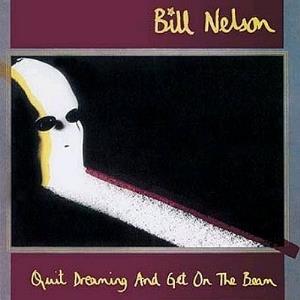Guitarist Bill Nelson’s trajectory has been eclectic and multi faceted – singer, guitarist, songwriter, producer, painter, video artist, writer to name but a few. After folding his 70s band ‘Be-Bop Deluxe’, he created ‘Red Noise’ (which the Harvest label insisted on calling ‘Bill Nelson’s Red Noise’) and released the excellent ‘Sound on Sound’ in 1979. When it came to its follow up, which was a more experimental and solo project rather than a band effort, Harvest balked and refused to release it. It finally saw the light of day in 1981, after protracted negotiations , the creation of his own Cocteau label, and a licensing deal with Mercury. Nelson was understandably vexed, voicing his frustrations in the sleeve notes, but ‘Quit Dreaming and Get on the Beam’ was at last out there.
Music was moving so fast back then, that maybe he felt the delay had cruelly robbed him of innovation, allowing other acts to catch up. In retrospect such fears were unfounded, as it still sounds quite unlike anything else. The album opens with ‘Banal’, a sentiment he evidently strongly felt, that we can all identify with today, “Every song I hear seems to sound the same, every face I see seems to say to me… Banal”. My memory of 1981 is anything but banal, and equally this song is a belter with it’s descending chugging riff counterpointed by an ascending wailing guitar. It’s songwriting as idiosyncratic and singular as Eno’s pop trilogy of albums, seeming to follow only its own rules.
Be-Bop Deluxe’s later work had embraced the synth ahead of the game, so Nelson effortlessly merged the electronics into his signature guitar sound with an adroitness worthy of ‘Ultravox!’ or ‘The Human League’. Such as on the delightfully jerky ‘False Alarms’, where Pink Floyd’s ‘Money’ meets Split Enz in an underwater elevator, or ‘UHF’ with its John Foxx camp coldness underpinned by squidgy Devo synths. ‘Youth of Nation on Fire’ sounds like Can, if Paul McCartney had sat in between takes of ‘Coming Up’.
Some overtly pop/rocky numbers also feature (‘A Kind of Loving’, ‘Decline and Fall’) but they are of the highest calibre; catchy, driving, hit-single material even.
Things terminate with the title track, oddly reminiscent of Daevid Allen’s ‘Now is the Happiest Time of Your Life’, if Ultravox! had been at the controls. Like Eno, Bill Nelson went on to immerse himself in the ambient and esoteric, to great effect and success, but like Eno, I find his period spent flirting with electronic quirky pop to be the most beguiling.

















No Comment